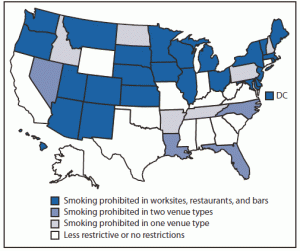An UPDATE

Over the last decade, we have made steady progress in
protecting Americans from the deadly consequences of tobacco use with passage of
comprehensive smoke-free policies. But it’s too soon to rest on our laurels.
Twenty-five states and the
District of Columbia have enacted smoke-free laws for
workplaces, bars and restaurants since 2000, according to the Centers for
Disease Control and Prevention (CDC), and if current trends continue, the nation
could be 100 percent smoke-free by 2020. However, nearly half of the country
still lacks comprehensive smoke-free laws, hampering efforts to reduce tobacco
use and smoking-related illnesses in the southern region of the country where
heart disease and stroke death rates remain high. Tobacco use is a major risk
factor for cardiovascular disease, the nation’s No. 1 killer. We must zero in on
those areas that continue to lag despite studies that show smoke-free policies
benefit public health and the local economy with lower health care
costs.
The CDC report, State Smoke-free Laws for Worksites, Restaurants,
and Bars – United States, 2000-2010, indicates approximately 88 million
Americans are still exposed to secondhand smoke and several states have
exemptions that put too many nonsmokers at risk. This remains a hurdle that must
be addressed with passage of strong legislation to close loopholes. Elected
officials, particularly those in the south, must do more to enact comprehensive
smoke-free laws and give citizens a greater opportunity to breathe clean
air.
For more information, visit the CDC
website.
Today, we’re celebrating a monumental victory in the fight against heart disease and stroke. Representing the American Heart Association’s 22 million volunteers, supporters and dedicated staff, AHA President Dr. Timothy Gardner and I were thrilled to stand with President Obama at the White House as he signed the bipartisan Family Smoking Prevention and Tobacco Control Act. This legislation represents another huge step toward breaking the deadly cycle of tobacco addiction that leads to an increased risk of heart disease and stroke for millions of Americans.
This bill, which had tremendous support from Republicans and Democrats alike, will give the Food and Drug Administration (FDA) the clear authority to regulate the manufacturing, advertising and promotion of tobacco products in order to protect public health. The bill also focuses on limiting advertising that targets our kids. It is estimated that the legislation will result in an eleven percent decline in underage smoking over the next decade and will significantly reduce the annual $100 billion cost for tobacco-related illnesses in the U.S.
Why is this legislative victory so important? Nearly one-third of cardiovascular disease deaths are linked to smoking, and tobacco use is the single most preventable cause of heart disease and stroke. For generations, tobacco companies lied to the public about the deadly dangers of tobacco use. They lied about the addictiveness of nicotine. They made misleading health claims about light and low-tar products. And they shamelessly and aggressively marketed to children to attract new smokers. These unconscionable practiceswill finally be reined in with effective government oversight of an industry that has placed profits above the health of the American people.
American Heart Association volunteers and staff, along with our public health partners, have been working for over a decade to see this legislation become law. We are extremely proud to have played a major role in moving this legislation through Congress and to have had the opportunity to join our Congressional champions today in witnessing the bill signing.
This measure, along with many other policy initiatives the association supports on the local, state and national level, directly impacts our mission to build healthier lives free of cardiovascular disease and stroke. This historic public health victory would not have been possible without the tenacious efforts and unwavering support of our You’re the Cure advocates — the volunteers and staff who worked to generate Congressional and public support for the measure.
If you are not already involved, you too can play a vital role in American Heart Association legislative advocacy efforts. Start today by thanking Members of Congress and the President for making this legislation a reality. Visit heartprescription.org to send your email.
I would also like to extend a personal and very special thank you to former CEOs Cass Wheeler and Dudley Hafner, who devoted much of their AHA careers to advancing this issue by meeting with members of Congress and speaking out loudly about the deadly effects of tobacco on our nation’s youth.
And finally, while the FDA bill represents an important victory, the fight against tobacco is not over. We must continue to push for smoke-free workplace laws, higher tobacco excise taxes and funding for comprehensive smoking prevention cessation programs to help break the cycle of addiction and create a healthier environment for our families. We’re counting on your continued support to help us achieve these important goals.
Sincerely,
![]()
Nancy Brown
Chief Executive Officer
P.S. You can learn more about this bill and our other legislative issues and share your comments on our You’re the Cure blog. You may also want to join Cass Wheeler, our former CEO, on Twitter as he shares his thoughts on this historic win. Follow him @casswheeler






You must be logged in to post a comment.